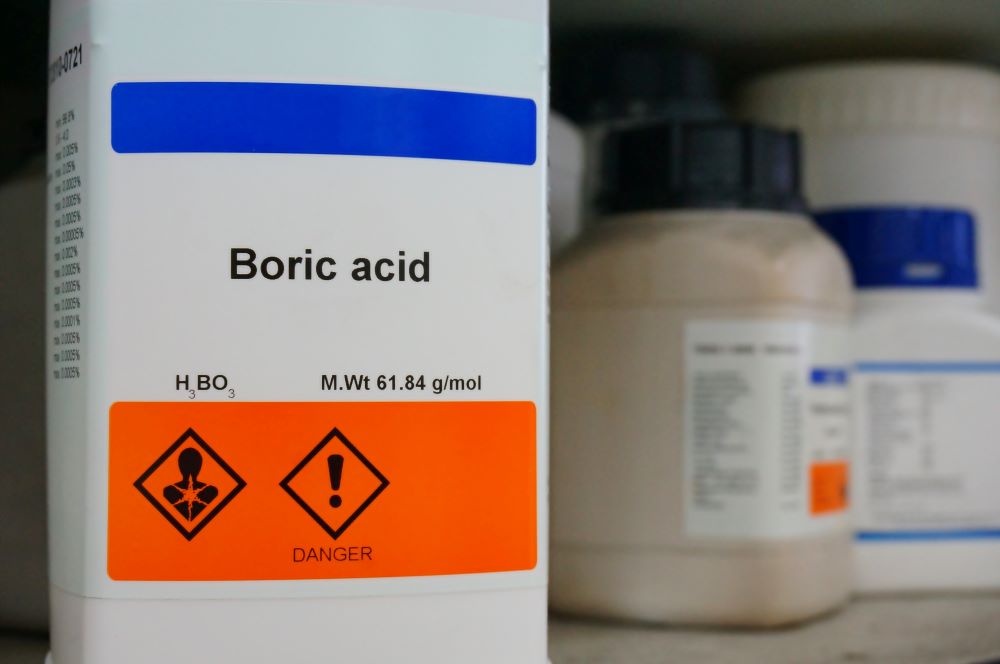
Boric acid, a common ingredient in many household products and pesticides, carries with it a host of potential dangers. From acute to chronic exposure, this chemical can wreak havoc on the human body, causing injuries and even proving fatal in severe cases. In this article, we will delve into the details of boric acid, its uses, potential hazards, and safety precautions.
What is Boric Acid?
Boric acid, also known as boracic acid or orthoboric acid, is a naturally occurring compound derived from the element boron. It appears as a white or colorless crystalline powder, and is weakly acidic. Boric acid and its sodium borate salts are utilized in a variety of applications, from antiseptics and astringents to enamels, glazes, and glass fiber manufacturing.
Common Uses of Boric Acid
Boric acid and its compounds have a wide range of uses, which increases the likelihood of human exposure. Some of the common applications include:
- Pesticides: Boric acid is an active ingredient in several insecticides, acaricides, algaecides, herbicides, and fungicides. It’s also used in wood preservatives to protect against pests.
- Medicated Powders: Some medicated powders contain boric acid for its antiseptic and astringent properties.
- Skin Lotions: Certain skin lotions include boric acid as an ingredient.
- Photography Chemicals: Boric acid is used in the development process for photographic film.
- Eye Wash Products: Some eye washes contain boric acid for its mild antiseptic effect.
However, it should be noted that the use of boric acid in medical preparations has decreased significantly due to the potential dangers associated with it.
Acute and Chronic Poisoning from Boric Acid
Exposure to boric acid can lead to acute or chronic poisoning. Acute poisoning typically occurs when someone unintentionally ingests a product containing boric acid, such as roach-killing powders. Acute poisoning manifests rapidly and can cause severe symptoms, including injuries to the tissues it contacts.
Chronic poisoning, on the other hand, evolves over a longer period due to repeated exposure to boric acid. This type of poisoning was more common in the past when boric acid was routinely used to disinfect and treat wounds. Repeated treatment resulted in several instances of sickness, and in severe cases, death.
The Health Risks of Boric Acid
Oral Exposure
When ingested, boric acid can cause significant harm, primarily associated with the amount of boron ingested from the parent compound. Ingesting even small quantities can result in symptoms like excessive salivation, thirst, fever, vomiting, depression, loss of appetite, diarrhea, and abdominal pain. The vomit or stools of affected individuals may contain blood or exhibit a blue-green color.
In more severe cases, ingestion of large amounts can lead to symptoms such as ataxia, tremors, seizures, decreased urination, and reddish-violet-colored skin. Metabolic acidosis, coma, and even death can follow seizures from massive oral ingestions of boric acid.
Dermal Exposure
Boric acid and sodium tetraborate decahydrate, also known as borax, demonstrate low toxicity when applied to undamaged skin. However, they can be absorbed through the skin if it is damaged, leading to potential health risks.
Inhalation
Inhalation of boric acid or borate salts can lead to absorption, although it’s unclear whether the majority is absorbed directly or ingested indirectly due to mucocillary activity. Inhalation can lead to temporary respiratory irritation, including dry mouth, nose and throat, coughing, sore throat, shortness of breath, and nosebleeds.
Potential Long-Term Health Effects
Chronic exposure to boric acid can lead to long-term health effects. Prolonged oral exposure can result in vomiting, nausea, diarrhea, stomach pain, headaches, fever, tremors, twitching, lethargy, weakness, and skin problems such as erythema, desquamation, and ulceration. Severe cases can lead to coma, seizures, circulatory collapse, liver and kidney dysfunction, anemia, and death.
Safety Precautions
Given the dangers of boric acid, it’s crucial to take safety precautions. Here are some measures to consider:
- Avoid Ingestion: Keep boric acid and products containing it out of reach of children and pets to prevent accidental ingestion.
- Avoid Skin Contact: Use gloves and protective clothing when handling boric acid.
- Avoid Inhalation: Use a mask or respirator when using boric acid in a dusty environment.
- Careful Disposal: Dispose of boric acid and its containers safely to prevent accidental exposure.
What to Do in Case of Boric Acid Exposure?
In case of exposure to boric acid, swift action is necessary. If the chemical is on the skin, wash the area thoroughly. If it has been swallowed, seek medical treatment immediately. If it has contacted the eyes, wash them with cool water for 15 minutes. And if it has been inhaled, move to fresh air immediately.
Professional Pest Control Services
While boric acid is a common ingredient in many pesticides and can be an effective solution for pest problems, it’s also important to consider the potential dangers associated with its use. This is where professional pest control services, like Banner Pest Control, come into play. With trained professionals who understand the potential risks and know how to safely handle and apply such products, you can effectively manage your pest problems without putting your health at risk.
Conclusion
In conclusion, while boric acid is a versatile compound with many uses, it also carries significant health risks. Understanding these dangers and taking the necessary precautions can help mitigate the risks associated with boric acid use. And when it comes to pest control, professional services offer a safer and more effective solution.
Remember, safety should always be a priority. Whether you’re dealing with a pest problem or using a product that contains boric acid, always handle with care and take the necessary precautions to protect your health and the health of those around you.

